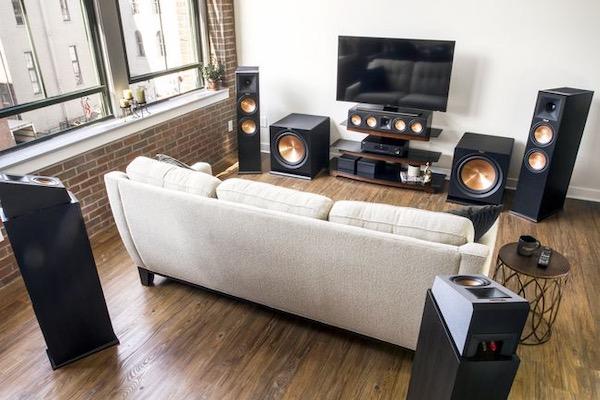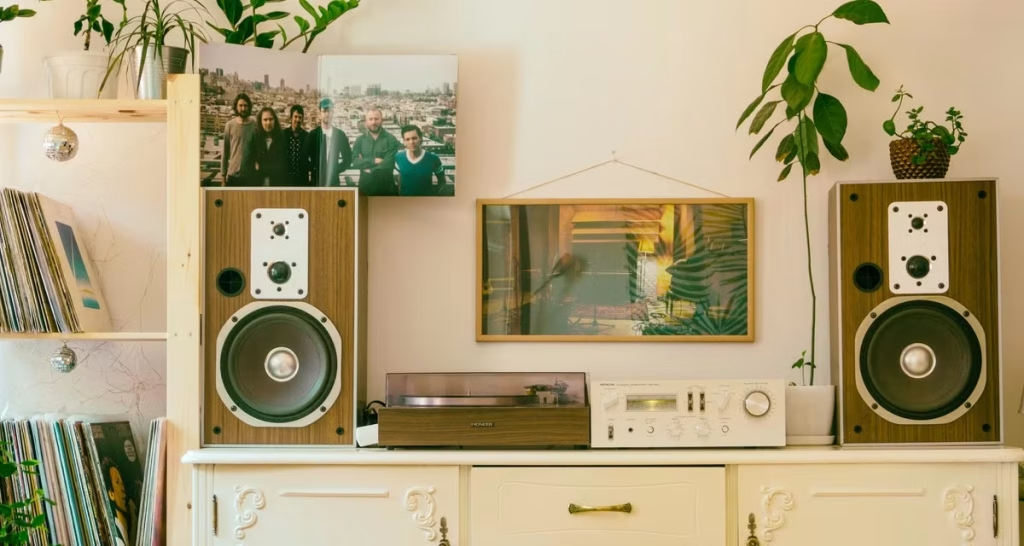Blog
How to Choose the Right Speaker Size for Your Space
Selecting the right speaker size for your space is crucial to achieving optimal sound quality. Whether you’re setting up a home theater, creating a music system, or just looking for a speaker for casual listening, the size of the speaker can significantly impact the sound experience. Too small, and the sound might lack depth; too large, and the audio might become overwhelming or distorted. In this guide, we’ll walk you through how to choose the right speaker size based on your room size, layout, and audio preferences.

1. Consider Your Room Size and Layout
The first step in choosing the right speaker size is understanding the size and layout of the room where you’ll be using them. Larger rooms, such as living rooms or home theaters, require bigger speakers that can produce enough sound to fill the space. On the other hand, smaller rooms, like bedrooms or offices, may benefit from more compact speakers.
Small Rooms (Under 150 sq ft)
In smaller spaces, you don’t need massive speakers to fill the room. A pair of bookshelf speakers or compact floor-standing speakers should be sufficient. These speakers are designed to deliver good sound without overwhelming the space. They’re perfect for listening to music, watching movies, or gaming in a smaller area.
- Recommended Speaker Sizes: Bookshelf speakers, small soundbars, or compact floor-standing speakers.
- Tips: For maximum audio clarity in tight spaces, consider speakers with a focus on midrange frequencies, which provide balanced sound.
Medium Rooms (150–300 sq ft)
For medium-sized rooms, you have more flexibility in terms of speaker size. You can use slightly larger bookshelf speakers, larger soundbars, or even more powerful floor-standing speakers if you prefer high-quality audio for music and home theater setups.
- Recommended Speaker Sizes: Medium bookshelf speakers, larger soundbars, or medium-sized floor-standing speakers.
- Tips: Look for speakers that can produce more bass without distortion, especially if you enjoy music genres like electronic or rock that demand punchy low-end sounds.
Large Rooms (Over 300 sq ft)
In large rooms, sound can dissipate quickly, so you’ll need larger speakers to ensure the sound is full and immersive. Full-range floor-standing speakers, subwoofers, and advanced sound systems will be the most effective for such spaces. These speakers can handle more power and create a fuller, richer sound that can fill the room.
- Recommended Speaker Sizes: Large floor-standing speakers, home theater systems, or tower speakers.
- Tips: In larger rooms, adding a subwoofer can significantly improve the bass response, ensuring a well-rounded sound experience. A surround sound system might also be beneficial for a truly cinematic audio experience.
2. Think About Your Audio Needs
Your choice of speaker size should also depend on what you plan to use it for. Different audio needs can dictate the type and size of speakers you require.
Music Listening
For music, clarity and balance are key. Smaller speakers are often enough for casual listening, but if you’re an audiophile or want to fill a larger room with rich, immersive sound, you might opt for medium to large speakers.
- Best Speaker Sizes for Music: Bookshelf or tower speakers, depending on room size and desired sound intensity.
- Additional Consideration: Consider speakers with wide frequency response to capture both high and low-end sounds accurately.
Home Theater
For home theater setups, you need speakers that can deliver dynamic sound with a focus on surround effects, clear dialogue, and powerful explosions. Larger speakers or a complete surround sound system with multiple speakers, including subwoofers, are ideal for creating an immersive cinematic experience.
- Best Speaker Sizes for Home Theater: Large floor-standing speakers for front channels, satellite speakers for surrounds, and a subwoofer for deep bass.
- Additional Consideration: A soundbar is a good alternative if you prefer a simpler setup without the need for multiple speakers. However, for the best experience, a multi-speaker surround sound system is recommended.

TV or Gaming
If you’re setting up a speaker system for TV watching or gaming, consider a balance between sound quality and space-saving convenience. A soundbar or compact speaker system is often sufficient for this purpose.
- Best Speaker Sizes for TV/Gaming: Soundbars, compact bookshelf speakers, or small tower speakers.
- Additional Consideration: Make sure the speaker system can deliver clear dialogue and deep bass to enhance both movie and gaming experiences.
3. Think About Power and Placement
The power of a speaker and its placement in the room also affects how well it will perform. Larger speakers often have higher wattage, meaning they can produce louder sound with greater clarity. However, if you’re placing speakers close to walls or corners, they might sound overly bass-heavy or boomy, especially in smaller spaces.
Speaker Placement
Where you place your speakers will have a significant impact on sound quality. In smaller rooms, speakers positioned too close to walls can cause echoing or muddiness. In large rooms, placing speakers too far apart might result in sound that feels distant or disconnected.
- Tip: Bookshelf speakers should be placed on stands or shelves at ear level for the best sound quality. Floor-standing speakers benefit from being spaced apart to avoid sound distortion.
Power Considerations
Speaker power (measured in watts) doesn’t necessarily mean louder sound, but it does impact how much dynamic range a speaker can handle without distortion. For larger spaces, higher wattage speakers or a multi-speaker system will provide better coverage and more impactful sound.
- Tip: Match the power rating of your speakers with the size of your room. Higher wattage speakers are ideal for larger rooms, but excessive power in smaller spaces can lead to harsh or overly loud sound.
4. Room Acoustics
Room acoustics play a huge role in how sound interacts with your space. A room with a lot of hard surfaces (like tile or glass) can cause sound to bounce and distort. Conversely, rooms with soft furnishings (like carpets and curtains) tend to absorb sound, which can result in a more muted experience.
- Tip: If your room has lots of hard surfaces, consider adding soft furnishings like rugs or curtains to improve acoustics. Alternatively, acoustic treatments like foam panels can help control sound reflections.

Conclusion
Choosing the right speaker size for your space involves considering a combination of factors: room size, audio needs, speaker power, and placement. In smaller rooms, compact speakers will suffice, while larger rooms require more powerful systems to achieve immersive sound. Whether you’re creating a home theater setup, enjoying music, or gaming, matching the right speaker size to your space ensures you get the best audio experience without overloading your room with unnecessary sound or underwhelming performance.
By taking the time to evaluate your space, sound preferences, and audio goals, you can make an informed decision and create an audio setup that suits both your environment and listening needs.

